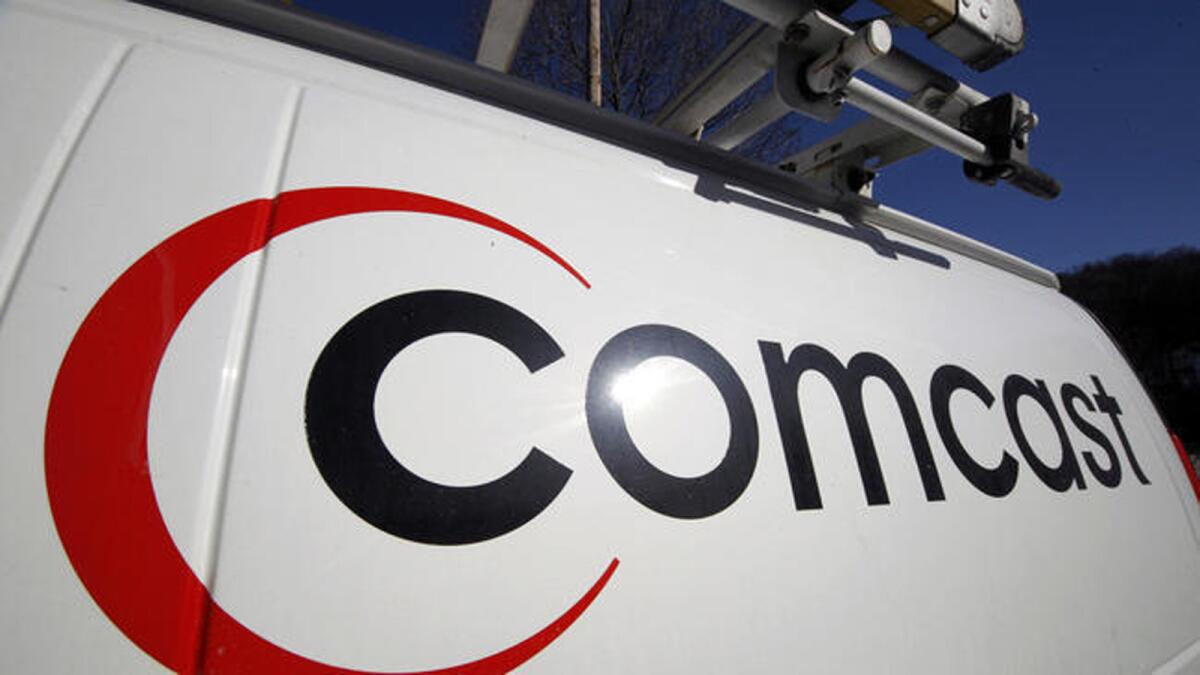Groups rally against Comcast-Time Warner Cable merger ahead of PUC hearing

California Public Utilities Commission members will hold a hearing in Los Angeles on Tuesday to hear public comment on the proposed Comcast-Time Warner Cable merger.
- Share via
A handful of consumers, advocacy groups and content creators banded together in downtown Los Angeles on Tuesday to protest the proposed Comcast Corp.-Time Warner Cable merger.
Holding signs with slogans such as “Comcast Mega Merger = worst customer service = fewer choices =higher prices” and sporting buttons with “No Comcast Mega Merger!” written on them, the coalition of opponents met to voice their concerns with members of the press.
The rally, held across the street from the Junipero Serra State Office Building, came about an hour before the California Public Utilities Commission’s scheduled public hearing on the issue.
The PUC held a hearing in San Francisco to receive comments on the proposed Comcast merger in late February and faced sharp criticism for not reaching out to the region most affected by the merger: Southern California. PUC members then quickly scheduled Tuesday’s hearing in Los Angeles.
If the merger goes forward, Comcast would have nearly 1.8 million customers in Greater Los Angeles. The deal would increase Comcast’s service footprint to about 80% of the state. Comcast currently provides service in Northern California.
The coalition included consumers, many from the Latino community in Los Angeles, as well as organizations such as the Writers Guild of America West, Consumers Union, Los Angeles Latino Chamber of Commerce, Presente.org, Estrella TV, Media Alliance, Courage Campaign and others.
Opponents contend that the merger is harmful to the general public because it would give Comcast a monopoly over the pay-TV market. They believe that the acquisition would specifically negatively affect Californians because it could lead to higher prices for cable and broadband services, less options for consumers and increased control over programming for Latino audiences.
“We have gotten an overwhelming response from consumers who are concerned,” said Michael McCauley, the media director for Consumers Union, the advocacy group that publishes Consumer Reports magazine. “Unexpected price hikes, billing mistakes and poor customer service are very frustrating for folks. They are worried the situation is going to go from bad to worse.”
However, a Comcast spokeswoman said the company “offers more programming choices than any other company, so the claims that this would diminish those choices are false.” She noted that nationally, Comcast “has a 40% penetration of our video and broadband products, far below a monopoly level.”
Some also argue that the merger could also have detrimental effects on the local economy.
“Los Angeles is already suffering from a loss of production over the last 10 years -- media consolidation like this will only make that tougher,” said Shawn Ryan, a television writer and member of the Writers Guild of America’s board of directors. “It will put things in fewer hands and fewer productions will get made.”
But Comcast said it is investing over $1 billion in its West Coast NBCUniversal operations, which is expected to create 30,000 jobs and generate $1.9 billion per year in economic benefit.
“One of the most important ways Comcast supports the creative community is by investing in the infrastructure that allows them to do their best work,” wrote David Cohen, Comcast’s executive vice president and chief diversity officer, wrote in blog posted on Tuesday.
Cohen said if approved, the partnership would “give millions of Americans access to the most robust video on demand platform in the world with more than 55,000 choices, more than double what is currently available to TWC customers.”
Though Comcast currently carries 60 channels geared towards the Hispanic community, Spanish TV broadcaster Estrella TV, which is a competitor to Comcast-owned Telemundo, feels at risk.
Estrella representatives at the rally said Comcast yanked the network off the air in Houston, Denver and Salt Lake City on Feb. 20. If the merger happens, network executives fear that they will be forced off air in other cities as well.
“If the merger goes through, it will have a chilling effect on innovation and creativity,” said Rocky Delgadillo, a former Los Angeles city attorney and current board member for Liberman Broadcasting Inc., which owns Estrella TV. “The Latino community will get only what Time Warner Cable and Comcast decide it will get. Not what [the community] wants.”
Comcast, however, said it is “not dropping Estrella.”
“Comcast already distributes Estrella TV programming broadly as Estrella’s largest distributor and we have been negotiating in good faith for months with Liberman Broadcasting to continue carrying its broadcast signals in these three markets, which represent only 20 percent of our total Estrella distribution,” the company said in a statement.
Regardless, opposition groups are hoping the PUC will prevent the acquisition from happening. After the rally, many attendees walked across the street and lined up to get their seats at the hearing.
Late last week, PUC Commissioner Mike Florio proposed that the regulatory panel block Comcast’s bid to acquire Time Warner Cable. Florio on Friday submitted an alternative proposal to the full commission to deny Comcast’s request to take over the licenses held in California by Time Warner Cable and Charter Communications.
The PUC has scheduled a May 21 vote on the proposed media merger. Florio’s proposal is the second one put before the PUC panel. Two months ago, a proposal favorable to Comcast was submitted, which means that the five PUC members have two alternatives to select from.
Administrative Law Court Judge Karl Bemesderfer in February recommended that the PUC approve the Comcast merger, saying the deal was in the public interest.
Comcast, for its part, has argued that it doesn’t compete in the same geographic regions as Time Warner Cable, and thus consumers would have the same number of choices for pay-TV and Internet providers.
“We continue to believe the administrative law judge’s decision, reached after months of briefings, analysis and careful consideration, has properly recommended approval of the Comcast-Time Warner Cable-Charter transaction,” Comcast spokesman Bryan Byrd said in a statement last week.
Comcast needs the PUC’s blessing for the deal because the commission regulates cable TV and phone service in California.
The Federal Communications Commission and the U.S. Department of Justice separately are reviewing the proposed merger, which would give Comcast nearly 30 million customers nationwide. Comcast hopes to prevail and complete the merger this summer.
For more entertainment industry news, follow us on Twitter @saba_h and @megjameslat.
More to Read
Sign up for The Envelope
Get exclusive awards season news, in-depth interviews and columnist Glenn Whipp’s must-read analysis straight to your inbox.
You may occasionally receive promotional content from the Los Angeles Times.











